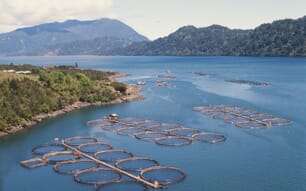The trial
Groups of juvenile Atlantic salmon were fed start feed containing two different levels of zinc until reaching 30 g (20 weeks). After 20 weeks, the fish were tagged, mixed, smoltified and transferred to sea cages.
The fish were monitored until they reached a weight of 2 kg (after about eight months in the sea cages). The mineral content of the fish was analysed five times during the trial period, and x-rays were taken numerous times during the trial.
The results demonstrate a need for better control of the supply of zinc from the feed, particularly to young fish.
Jigsaw of minerals
Phosphorus and calcium are minerals that we know are of major significance for the fish developing a normal skeleton. In earlier trials involving phosphorus, it was observed that the negative effects of phosphorous deficiency were more severe when the feed also contained insufficient zinc. Through the EU project FineFish, the Nofima Marin scientists wanted to find out if zinc deficiency also produced specific effects in the skeletal development.
Analyses of the zinc content in small salmon often show low values. It is common to find a zinc level of 30-40 mg/kg fish in juvenile fish fed commercial feeds, while the reference values lie at 50-60 mg/kg. Consequently, there is every reason to pay attention to this mineral, allthough zinc deficiency alone is not a large problem in salmon farming.
Enhanced effect when the fish grows
The scientists at Nofima Marin followed the salmon from start feeding through to approximate slaughter weight. At the juvenile stage, there were few exterior symptoms of zinc deficiency, apart from the fish having high condition factors and being slightly more rounded in shape. The x-ray images, though, showed compressed vertebrae and a lack of space between the vertebrae in some of the fish.
Grete Bæverfjord of Nofima Marin, who was the technical manager in the FineFish project, says the long-term effects were clear: “During smoltification the compressed vertebrae had become visibly abnormal in form and at a size of 2 kg the spine was outright malformed in these individuals .”
These finds confirm how important good mineralisation of the skeleton in the early stages of life is for preventing skeletal malformations, and confirms that zinc is a mineral that must be controlled. “This knowledge about the significance of having enough zinc is another piece in the jigsaw about causal factors for malformations in farmed salmon,” says Ms Bæverfjord.
The solution to the challenge of ensuring salmon receive sufficient zinc lies in the knowledge of feed ingredients and optimal use of supplements. Young salmon grow extremely rapidly and utilize the feed very effectively. Consequently, old recommendations about mineral requirements can prove to be outdated for today’s conditions, say the scientists, who hope that the feed manufacturers will take this new knowledge into consideration.
“What the salmon farmers can do is turn attention to this topic by requesting information from the feed suppliers about how the feed actually influences mineralisation of the skeleton in commercial production,” says Ms Bæverfjord.
She also encourages the salmon farmers to analyse the mineral content and skeletal structure of the fish if there are reasons for concern.
How do you prevent malformations?
The FineFish project, which was financed by the EU, delivered its project report in the form of a practical manual for fish farmers. The scientists at Nofima Marin have made major contributions to this report, which in addition to salmon deals with rainbow trout, sea bass and sea bream.
Zinc Deficiency Cause Of Short Spine
NORWAY - Norwegian farmed Atlantic salmon Contain low levels of zinc in Their bodies. New research carried out by Nofima, has shown that salmon receiving insufficient zinc in early stages of like can develop short and malformed vertebrae.

